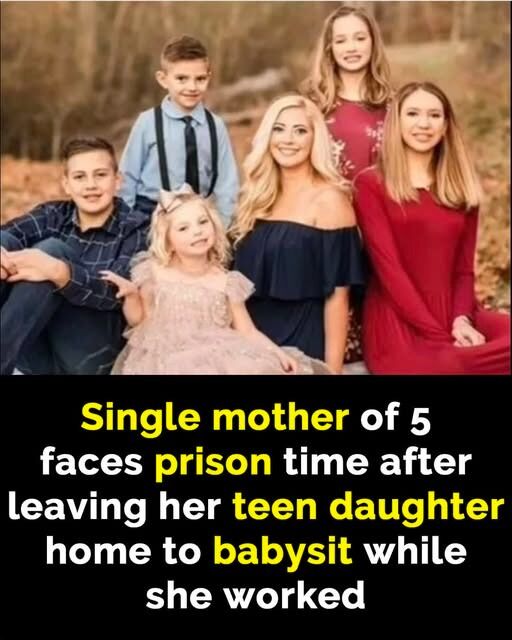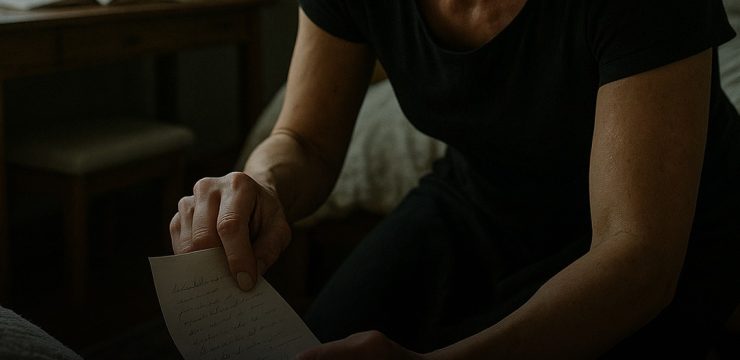Being a parent is one of the most challenging jobs in the world. It requires constant decision-making, problem-solving, and, at times, making tough choices just to get through the day. For single parents, these challenges are amplified, as they must handle everything alone—from finances to childcare and everything in between. Now, one single mother of five from Georgia is facing potential jail time for something that many parents have likely done: leaving her teenage child in charge of babysitting younger siblings.

Her case has ignited a debate about parenting, legal responsibility, and how society should support struggling families. Some people believe she made a reasonable decision under difficult circumstances, while others argue that her actions put her children at risk. Regardless of which side of the debate people fall on, the case raises important questions about childcare laws, affordability, and the pressures faced by single parents.
The Situation
According to reports, the mother left her 14-year-old child in charge of the younger siblings while she went to work. This is not an unusual scenario—many families rely on older children to help with childcare, especially when hiring a babysitter is not an affordable option. However, in this case, authorities saw it differently, charging the mother with reckless conduct.
For many people, this legal response feels extreme. In generations past, it was common for teenagers to take on babysitting duties, not just for their own siblings but for neighbors and family friends as well. Many of today’s parents grew up watching younger brothers and sisters when their own parents were at work or out running errands. It’s a practice that still exists in countless households today, particularly in single-parent homes where the need for childcare is constant.
However, child safety laws have evolved over time, and what was once seen as normal parenting is now viewed through a different legal lens. Each state has different rules regarding the minimum age a child can be left alone or be responsible for younger siblings. While Georgia does not have a strict law specifying an age requirement, authorities have discretion in determining whether a situation qualifies as child endangerment.
The Debate
This case has sparked mixed reactions. Supporters of the mother argue that instead of punishing her, society should be helping single parents navigate the difficulties of raising children alone. With the rising cost of childcare, many parents struggle to find affordable solutions. Babysitting services can be expensive, and daycare centers often have long waitlists or costs that exceed a parent’s budget. In many cases, parents have no choice but to rely on family members or older siblings to help.
Critics, on the other hand, believe that leaving a teenager in charge of younger children carries risks. Emergencies can happen at any time, and a 14-year-old, no matter how mature, may not be equipped to handle serious situations. Some argue that parents need to explore safer alternatives, such as seeking help from community programs or family members who are legal adults.
Legal experts have weighed in, noting that while the law does not explicitly ban teenagers from babysitting, the final decision often depends on the circumstances. If authorities believe the children were left in an unsafe environment or without adequate supervision, they have the right to intervene.
The Bigger Issue: Childcare Challenges
This case highlights a larger problem that many parents, particularly single mothers, face—affordable childcare. The U.S. lacks a comprehensive childcare support system, leaving millions of parents struggling to balance work and family responsibilities. Many families cannot afford professional babysitters or daycare services, yet they are penalized when they try to make reasonable arrangements with the resources they have.
In an ideal world, parents would always have access to safe, reliable, and affordable childcare. But the reality is far from that. Childcare costs continue to rise, and for low-income families, the options are limited. Many parents are forced to make difficult choices, not because they are irresponsible, but because they simply don’t have better alternatives.
Instead of criminalizing struggling parents, many believe that society should be investing in solutions. Expanding access to affordable childcare, offering subsidies, and creating community-based programs could help prevent situations like this from happening. If parents had the support they needed, they wouldn’t have to rely on teenagers to fill the gaps in childcare.
What Happens Next?
As this case unfolds, the mother now faces the possibility of jail time, which could have devastating consequences for her family. Many people are calling for leniency, arguing that putting a mother in jail for trying to provide for her children is not the answer. Others believe that while she should not be punished harshly, the case does raise valid concerns about child supervision.
Regardless of the legal outcome, this case serves as a wake-up call about the realities of parenting today. Single parents are often put in impossible situations, expected to work and provide for their families while also being available 24/7 for their children. Without better systems in place, these challenges will only continue.
Final Thoughts
Parenting is never perfect. Every mother and father makes mistakes, and every parent faces difficult decisions at some point. This Georgia mother’s case is not just about one individual—it’s about the millions of parents who face similar struggles every day. Instead of punishing those who are trying their best, society should be working to create solutions that help families thrive.
At the end of the day, this case is not just about whether a 14-year-old can babysit their younger siblings. It’s about how we, as a society, support parents who are doing everything they can to care for their children in a world where resources are limited. The real issue isn’t whether this mother made the right decision—it’s why she had to make that choice in the first place.





